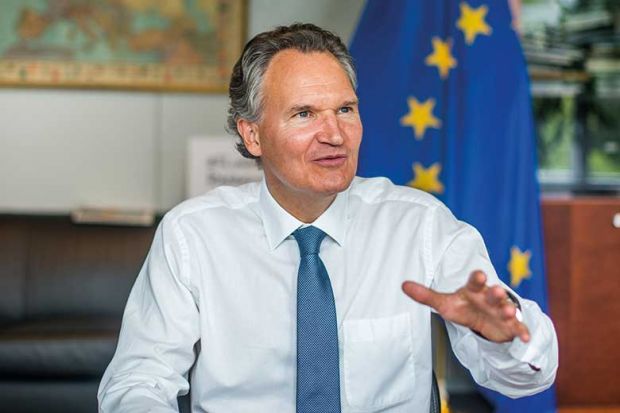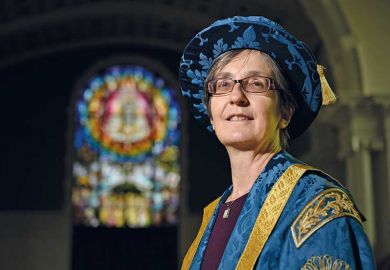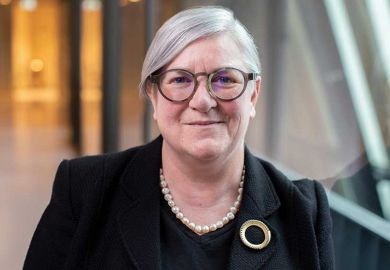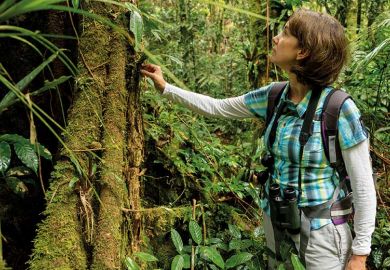Robert-Jan Smits is the European Commission’s open access envoy and leads Plan S, the open access initiative launched by Science Europe which seeks to ensure that research funded by participating organisations is made immediately and freely available. Between 2010 and 2018 he was the commission’s director-general of research and innovation, leading the development of the Horizon 2020 funding programme and playing a key role in the development of the European Research Council. He will leave his current post on 1 March to become chair of the board of Eindhoven University of Technology.
Where and when were you born?
Waalwijk, a small town in the Netherlands, in 1958. Although the town is small, it is home to a Nobel laureate, a world gymnastics champion and a football team that played for many years in the Dutch premier league (unfortunately not any more).
How has this shaped who you are?
It was a safe and secure environment in which to grow up, with a beautiful forest next door and a small pond behind the house where we played as children in absolute freedom.
What kind of undergraduate were you?
A hard-working one, sometimes a bit too serious. Luckily, this changed during my graduate years.
Have you ever had a ‘eureka’ moment?
When I was reflecting last year on how we could accelerate the transition to full and immediate open access.
What has been your most satisfying moment during your time working on Plan S?
The launch of the plan on 4 September was just incredible – 70,000 tweets, a mailbox that exploded and non-stop calls from all over the world.
And the worst?
When unfounded criticism was issued and nasty accusations were made: that it “violates academic freedom” and will put an end to global cooperation, as if Plan S will cause Armageddon. The funniest response was that it looks like a manifesto for the Salvation Army.
When will Plan S be complete?
That’s the billion-dollar question. One thing is for sure and that is that, the more funders join Coalition S, the greater the chance that the “big flip” will happen. In my opinion the tipping point is in reach if some key organisations such as the US National Institutes of Health join in. No pressure! They hold the keys in their hands.
What do you do to switch off from it all and have fun?
I jump on my cross trainer and sweat it all out.
How did you end up taking your new role at Eindhoven and what are you looking forward to most?
The Eindhoven University of Technology is an amazing place located at the core of an impressive innovation ecosystem composed of high-tech companies such as ASML NXP, Philips, DAF and VDL. Forbes once called this “the most innovative region in the world”. The university staff are very impressive and have innovation in their genes. The students are taught to be entrepreneurial and to think outside the box. They participate in the Australian solar race, run a robotics football team and build 3D-printed houses. In other words, it is the place to be. When I heard that the current president had reached the end of his term and was leaving, I immediately applied for the job and was lucky to get it. What makes it even more special for me is that I was born and bred in Brabant, the province where the university is located.
Will you be able to let go of Plan S?
Yes, because I know that with the members of Coalition S, it will be in good hands. Of course it will always be my baby, but babies grow up, become adolescents and one day start a life of their own.
What advice would you give your younger self?
Be less serious and enjoy life.
Tell us about someone you admire?
Nelson Mandela. What an impressive person. He spends 27 years in prison, being humiliated and then when he gets out and is in power he has no feelings of revenge or hate, he talks about reconciliation. Men like that aren’t made any more.
What keeps you awake at night?
Because of Plan S, I go to bed so late that I fall asleep immediately. I am just too tired to be kept awake by anything at night.
Do you live by any motto or philosophy?
“A day not laughed is a day not lived” – stolen from Toon Hermans, a Dutch author and comedian.
What would you like to be remembered for?
My first reaction would be: wait a minute, we are not there yet! What is important in life is to have meaning, to have purpose. This can take different forms. Among my friends and family, I hope to be remembered for my love, loyalty and affection. In my professional life, I hope to be remembered for my contribution and commitment to science, and science without borders.
What one thing would improve your working week?
Having two extra working days.
rachael.pells@timeshighereducation.com
Appointments
Jane Norman is to become dean of the University of Bristol’s Faculty of Health Sciences. Professor Norman, who is professor of maternal and fetal health at the University of Edinburgh, will take up her new role in August. She is also Edinburgh’s vice-principal for people and culture, where she has led the university’s strategy for equality and diversity, and deputy director of the Medical Research Council Centre for Reproductive Health. Judith Squires, Bristol’s deputy vice-chancellor and provost, described Professor Norman as an “outstanding scholar with an exemplary record of personal academic achievement and significant leadership experience at the highest levels.”
Danwood Chirwa has been chosen as dean of the University of Cape Town’s Faculty of Law. Professor Chirwa, a Malawian who joined Cape Town in 2004 and was head of its public law department from 2009 to 2014, said that he would seek to “add value, bring stability and improve the way we work and the services we provide”. He also said that he wanted to “enhance the African focus” of the university’s law degrees and “alter the way students and staff view law”.
Selina Stead is to become head of the University of Stirling’s Institute of Aquaculture. She is currently professor of marine governance and environmental science at Newcastle University and will continue to be the UK government’s chief scientific adviser for marine management organisation when she takes up her new role in March.
Simon Parson, who leads the anatomy department at the University of Aberdeen, has been appointed Regius chair of anatomy.
Ann Huff Stevens has been named the next dean of the University of Texas at Austin’s College of Liberal Arts. The economics professor will arrive from the University of California, Davis in July.
Graham Hingangaroa Smith has been appointed deputy vice-chancellor (Mãori) at Massey University, in New Zealand.
Register to continue
Why register?
- Registration is free and only takes a moment
- Once registered, you can read 3 articles a month
- Sign up for our newsletter
Subscribe
Or subscribe for unlimited access to:
- Unlimited access to news, views, insights & reviews
- Digital editions
- Digital access to THE’s university and college rankings analysis
Already registered or a current subscriber?




